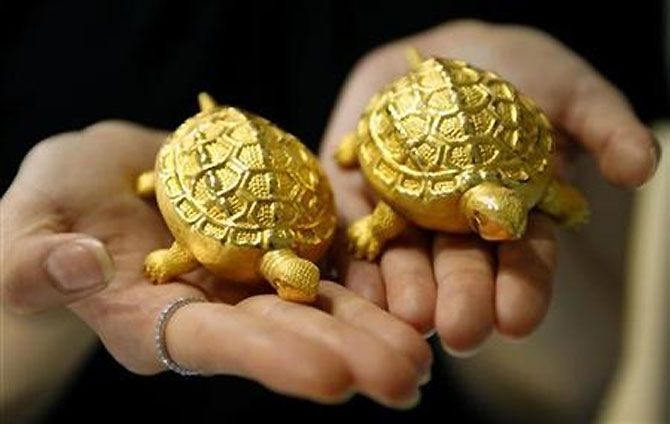'If unchecked, by 2017, the global volume of discarded e-waste will weigh almost equivalent to 200 Empire State buildings.'
 E-waste, which comprises precious metals like gold and silver, can produce more gold than what is obtained through mining, a senior academician said on Wednesday.
E-waste, which comprises precious metals like gold and silver, can produce more gold than what is obtained through mining, a senior academician said on Wednesday.
Fifty pounds of gold and 20,000 pounds of copper could be extracted from one million discarded cell phones, if processed properly, Pranabesh Ray, Dean (Academics), XLRI - Xavier School of Management told a two-day national conference on e-waste management in Jamshedpur.
Emphasising the need for proper management of e-waste, Ray said, globally, about 64.5 million tonnes of e-waste are generated annually of which, only around 40 per cent is processed properly.
India ranked third in the world in e-waste generation per annum, he said, adding that the country generated 1.7 million tonnes of e-waste in 2014.
The volume of e-waste is increasing everyday, thus becoming a major environmental concern even as the common man is unaware of his contribution to it, said Ray.
If unchecked, by 2017, the global volume of discarded e-waste will weigh almost equivalent to 200 Empire State buildings, he added.
While 70 per cent of discarded electronic gadgets ends up in landfills, thus contaminating the environment with hazardous materials, only 30 per cent of it is recycled, said the academician.
The volume of e-waste is growing due to 'human greed', said Ray, adding that users prefer to change cell phones even when they are working. The problem is also amplified by 'illegal' dumping of dysfunctional products by developed countries who do so under the pretext that the products are for re-use, he said.
The conference was organised by Centre for Global Management and Responsible Leadership (CGMRL) at XLRI – Xavier School of Management, University of Queensland, Australia and IIT, Kharagpur.
Speaking on the occasion as the guest of honour, Shreekant Mokashi, chief (Group Information Services), Tata Steel, strongly advocated for a mechanism to extend the life of electronic gadgets.
"We will have to develop a mechanism to extend the life of electronic gadgets," he said, adding that an electronic gadget may not be useful for a particular industry, but it may prove to be useful for another.
The mechanism should be developed particularly for those sections of the society who do not have access to it, Mokashi said, while branding mobile phones and laptops, among others, as "major contributors to e-waste".
Mokashi also suggested to create a chain of eco-supply system, development of a business module by a set of entrepreneurs and certified processing agents for disposal of e-waste.
"The kabadiwala (scrap dealer) is not trained as far as disposal of hazardous e-waste is concerned," he said, expressing apprehension that disposal of e-waste in an improper manner is a threat to environment.
Anthony Halog from Geography Planning and Environment Management, University of Queensland, Australia, echoed a similar view, while stating that e-waste is a major environmental problem, also adding to global warming.
He though mentioned that development is gradually being witnessed as regards e-waste management.
"During the conference, we will deliberate on how can we develop the waste of an industry into a resource for another," Halog said.
E-waste, however, has a great potential of meeting the requirements of rare metals if it is properly recycled, he said.
Among others, Pingali Venugopal, chairperson of CGMRL, and Brajesh Kr Dubey from environmental engineering division, department of civil engineering, Indian Institute of Technology, Kharagpur, also spoke on the occasion.







 © 2025
© 2025